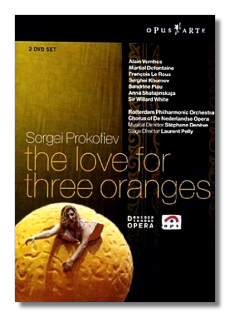
The Internet's Premier Classical Music Source
Related Links
- Prokofieff Reviews
- Latest Reviews
- More Reviews
-
By Composer
-
Collections
DVD & Blu-ray
Books
Concert Reviews
Articles/Interviews
Software
Audio
Search Amazon
Recommended Links
Site News
 DVD Review
DVD Review
Serge Prokofieff

The Love for Three Oranges
- Alain Vernhes – King of Clubs
- Martial Defontaine – the Prince (the King's son)
- Sandrine Piau – Ninette
- Anna Shafajinskaia – Fata Morgana
- François Le Roux – Leandro, the Prime Minister
- Serghei Khomov – Truffaldino, a court jester
- Natasha Petrinsky – Princess Clarice
- Marcel Boon – Pantaloon
- Willard White – Tchelio
Choir of De Nederlandse Opera
Rotterdam Philharmonic Orchestra/Stephane Deneve
Laurent Pelly – Stage Director, Costume Designer
Recorded Live in 2005 at the Het Muziektheater, Amsterdam
Opus Arte OA0957D 2DVDs 144min Dolby Digital DTS LPCM Stereo Anamorphic Widescreen
This entertaining production of Prokofieff's most popular comic opera, recorded in Amsterdam in 2005, uses the opera's original French text – a wise move, in my opinion, as Russian-language performances sound too heavy. Stage director and costume designer Laurent Pelly emphasizes the theme of playing cards. For example, the Prince sleeps in an empty box of them, and, during the scene in the desert, they provide shelter from the oppressive heat. Giant cards also serve as mobile flats, which are efficiently wheeled around by stage-hands during scene changes. The implication is that all the characters are living in a house of cards. If this performance is rather lacking in laughter, it's not only because Pelly eschews slapstick and cheap laughs. Comedy is notoriously more difficult to perform than tragedy, and that difficulty is doubled on the operatic stage.
If this performance also does not touch the heart, blame Prokofieff, who drops the commedia dell'arte mask only during the nearly fatal first meeting between Princess Ninetta and the Prince. Otherwise, this is Prokofieff at his most relentlessly clever. Hearing this opera, it is hard to believe that Carlo Gozzi, the Italian playwright who wrote the original Love for Three Oranges, also wrote what became the basis of Puccini's heartbreaking Turandot.
Despite the popularity of the orchestral suite, and the famous March in particular, this is not an opera based on set pieces – arias, duets, and the like. The Love for Three Oranges depends on the strength of the entire cast (and the conductor) to succeed. Fortunately, this production's musical values are strong. As the Prince, tenor Martial Defontaine is on stage much of the time, and he conserves his resources well in order to have something good left for his first scene with Ninetta. Sandrine Piau's Ninetta is sung with fairy-tale silver in the voice; it is interesting to hear an early music specialist in a twentieth-century opera! As often is the case, the "bad guys" are more notable – Petrinsky, Shafajinskaja, and Le Roux make the most of their opportunities. Richard Angas's brief scene as Creonte's grotesque cook – watch out for her soup ladle! – is very funny. As Truffaldino, Sergei Khomov shows comic potential, and Willard White is an impressive magician. Stéphane Denève keeps everything moving along, but not at the expense of precision, which is absolutely necessary for this opera's success.
The bonus material includes a 25-minute "introduction" which indeed should be viewed prior to watching the opera proper. Like the opera itself, it is breezy and uncovers no great profundities, but it does include interviews with Pelly, Denève, and several of the singers. (I feel it was a bad decision to interview some of them in English, however, because their responses are close to unintelligible.)
Sound (LPCM stereo or DTS surround) and image (16:9) are excellent, and the English subtitling is well done.
Copyright © 2007, Raymond Tuttle




















